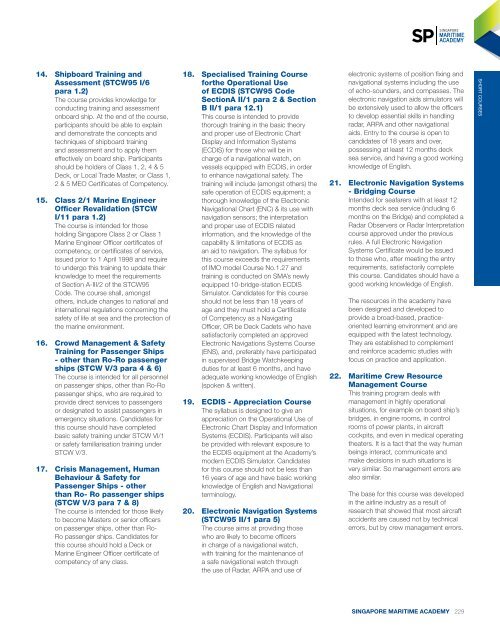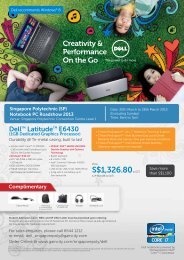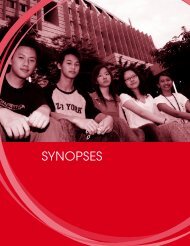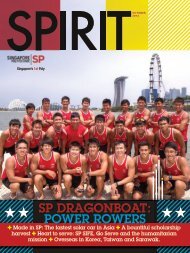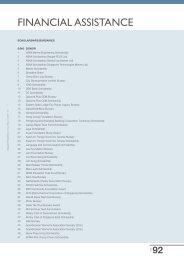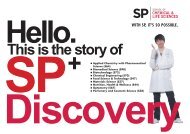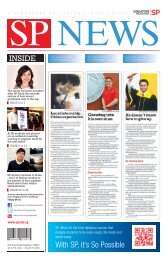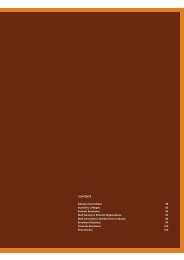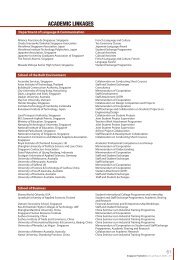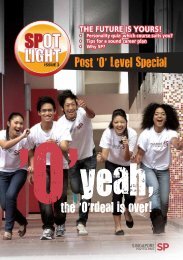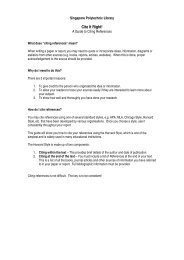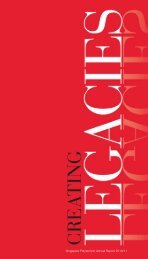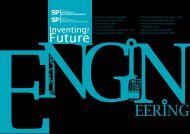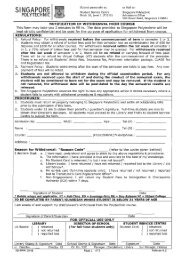Untitled - Singapore Polytechnic
Untitled - Singapore Polytechnic
Untitled - Singapore Polytechnic
- No tags were found...
Create successful ePaper yourself
Turn your PDF publications into a flip-book with our unique Google optimized e-Paper software.
14. Shipboard Training andAssessment (STCW95 I/6para 1.2)The course provides knowledge forconducting training and assessmentonboard ship. At the end of the course,participants should be able to explainand demonstrate the concepts andtechniques of shipboard trainingand assessment and to apply themeffectively on board ship. Participantsshould be holders of Class 1, 2, 4 & 5Deck, or Local Trade Master, or Class 1,2 & 5 MEO Certificates of Competency.15. Class 2/1 Marine EngineerOfficer Revalidation (STCWI/11 para 1.2)The course is intended for thoseholding <strong>Singapore</strong> Class 2 or Class 1Marine Engineer Officer certificates ofcompetency, or certificates of service,issued prior to 1 April 1998 and requireto undergo this training to update theirknowledge to meet the requirementsof Section A-III/2 of the STCW95Code. The course shall, amongstothers, include changes to national andinternational regulations concerning thesafety of life at sea and the protection ofthe marine environment.16. Crowd Management & SafetyTraining for Passenger Ships- other than Ro-Ro passengerships (STCW V/3 para 4 & 6)The course is intended for all personnelon passenger ships, other than Ro-Ropassenger ships, who are required toprovide direct services to passengersor designated to assist passengers inemergency situations. Candidates forthis course should have completedbasic safety training under STCW VI/1or safety familiarisation training underSTCW V/3.17. Crisis Management, HumanBehaviour & Safety forPassenger Ships - otherthan Ro- Ro passenger ships(STCW V/3 para 7 & 8)The course is intended for those likelyto become Masters or senior officerson passenger ships, other than Ro-Ro passenger ships. Candidates forthis course should hold a Deck orMarine Engineer Officer certificate ofcompetency of any class.18. Specialised Training Courseforthe Operational Useof ECDIS (STCW95 CodeSectionA II/1 para 2 & SectionB II/1 para 12.1)This course is intended to providethorough training in the basic theoryand proper use of Electronic ChartDisplay and Information Systems(ECDIS) for those who will be incharge of a navigational watch, onvessels equipped with ECDIS, in orderto enhance navigational safety. Thetraining will include (amongst others) thesafe operation of ECDIS equipment; athorough knowledge of the ElectronicNavigational Chart (ENC) & its use withnavigation sensors; the interpretationand proper use of ECDIS relatedinformation, and the knowledge of thecapability & limitations of ECDIS asan aid to navigation. The syllabus forthis course exceeds the requirementsof IMO model Course No.1.27 andtraining is conducted on SMA’s newlyequipped 10-bridge-station ECDISSimulator. Candidates for this courseshould not be less than 18 years ofage and they must hold a Certificateof Competency as a NavigatingOfficer, OR be Deck Cadets who havesatisfactorily completed an approvedElectronic Navigations Systems Course(ENS), and, preferably have participatedin supervised Bridge Watchkeepingduties for at least 6 months, and haveadequate working knowledge of English(spoken & written).19. ECDIS - Appreciation CourseThe syllabus is designed to give anappreciation on the Operational Use ofElectronic Chart Display and InformationSystems (ECDIS). Participants will alsobe provided with relevant exposure tothe ECDIS equipment at the Academy’smodern ECDIS Simulator. Candidatesfor this course should not be less than16 years of age and have basic workingknowledge of English and Navigationalterminology.20. Electronic Navigation Systems(STCW95 II/1 para 5)The course aims at providing thosewho are likely to become officersin charge of a navigational watch,with training for the maintenance ofa safe navigational watch throughthe use of Radar, ARPA and use ofelectronic systems of position fixing andnavigational systems including the useof echo-sounders, and compasses. Theelectronic navigation aids simulators willbe extensively used to allow the officersto develop essential skills in handlingradar, ARPA and other navigationalaids. Entry to the course is open tocandidates of 18 years and over,possessing at least 12 months decksea service, and having a good workingknowledge of English.21. Electronic Navigation Systems- Bridging CourseIntended for seafarers with at least 12months deck sea service (including 6months on the Bridge) and completed aRadar Observers or Radar Interpretationcourse approved under the previousrules. A full Electronic NavigationSystems Certificate would be issuedto those who, after meeting the entryrequirements, satisfactorily completethis course. Candidates should have agood working knowledge of English.The resources in the academy havebeen designed and developed toprovide a broad-based, practiceorientedlearning environment and areequipped with the latest technology.They are established to complementand reinforce academic studies withfocus on practice and application.22. Maritime Crew ResourceManagement CourseThis training program deals withmanagement in highly operationalsituations, for example on board ship’sbridges, in engine rooms, in controlrooms of power plants, in aircraftcockpits, and even in medical operatingtheaters. It is a fact that the way humanbeings interact, communicate andmake decisions in such situations isvery similar. So management errors arealso similar.The base for this course was developedin the airline industry as a result ofresearch that showed that most aircraftaccidents are caused not by technicalerrors, but by crew management errors.Short Coursessingapore maritime academy 229


